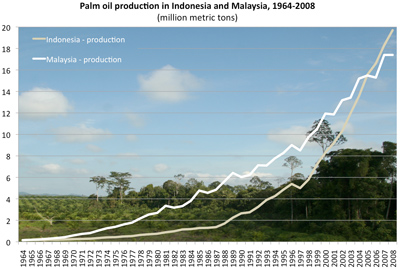BBC documentary leads Unilever to blacklist Indonesian palm oil company
Unilever has told Indonesian suppliers to stop sourcing palm oil from Duta Palma due to concerns over deforestation, reports Reuters
mongabay.com | February 24, 2010
Unilever's warning comes shortly after a BBC documentary linked palm oil used in the company's products to rainforest destruction by Duta Palma.
Derom Bangun, vice-chairman of the Indonesian Palm Oil Board, an industry body, told Reuters Unilever's decision was a direct result of the documentary.
"It is Unilever's decision," Bangun told Reuters. "Unilever did not have a supply contract with Duta Palma to begin with. They are safeguarding their supply mechanisms by asking their traders not to buy palm oil from this company after that BBC report."
Peat forest conversion for an oil palm plantation in Kalimantan, Indonesian Borneo.
The move comes two months after Unilever, the world's largest corporate palm oil buyer,dropped a $32.6 million contact with PT Smart, a subsidiary of Sinar Mas, Indonesia's largest palm oil producer, due to the company's poor environmental record. Sinar Mas has seen an exodus of major Western buyers in recent weeks.
The latest move by Unilever adds pressure on the Roundtable on Sustainable Palm Oil (RSPO), a budding certification scheme that aims to encourage environmental stewardship among palm oil producers. RSPO is seen by many as a path forward towards more responsible palm oil production, but the initiative has been criticized by environmentalists for weak monitoring and compliance protocols. The Duta Palma incident adds fuels to the fire since the company is a member of RSPO.
"It creates a lot of suspicion between the two groups," an RSPO official in Malaysia told Reuters.
"But it highlights the difficulty of trying to stay green, especially when the Indonesian government is handing out concessions to develop oil palms."
Oil palm agriculture
As the world's oil palm is the highest-yielding commercial oilseed, palm oil production offers more vegetable oil per unit of area than other widely-grown crops including soy, canola, or rapeseed. Thus oil palm expansion on abandoned agricultural landscould offer producers a more effective way to sustainably meet growing demand for vegetable oils than with other oilseeds.
Environmentalists are most concerned by palm oil production that comes at the cost of carbon-dense and biologically-rich rainforests and peatlands. Since 1990 more than half of plantation growth has occurred at the expense of natural forests, boosting greenhouse gas emissions and increasing the vulnerability of endangered species like orangutans, Sumtran rhinos, pygmy elephants, and Sumatran tigers to extinction in the wild. Plantations have also been strongly associated with social conflict in some areas.











No comments:
Post a Comment